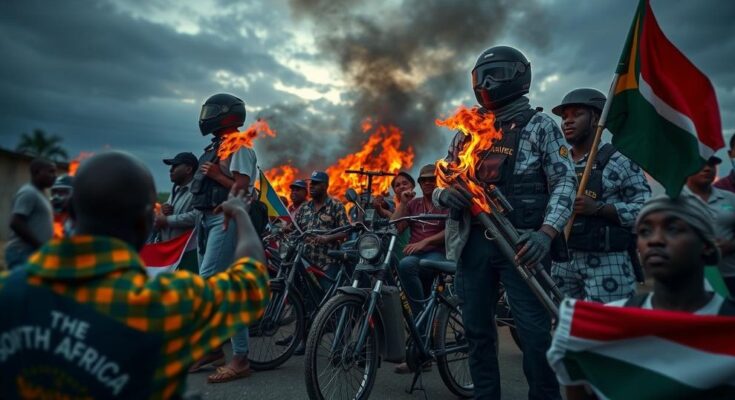Mozambique is facing escalating protests following the October 9 elections that secured the ruling FRELIMO party’s continued reign amid allegations of electoral fraud. Opposition leader Venancio Mondlane has encouraged public demonstrations, while the government’s response has included police violence and internet disruptions. The situation has led to fatalities among protesters and the closure of the Mozambique-South Africa border after unrest, indicating potential for a significant change in the country’s political landscape.
In Mozambique, protests have erupted following the October 9 elections, which resulted in the incumbent party, FRELIMO (Mozambican Liberation Front), retaining power under President Daniel Chapo. The opposition, led by Venancio Mondlane from the PODEMOS party, has alleged widespread electoral fraud. Mondlane, facing threats to his safety, has encouraged citizens to demonstrate against the election results. Meanwhile, Mozambican security forces have responded with violence, leading to multiple fatalities and injuries among protesters, raising alarm over the situation’s potential escalation. As a countermeasure, authorities have intermittently cut internet access to suppress the protests, which have taken on unique forms, such as residents banging pots in unison. The closure of the Mozambican-South African border due to vandalism adds to the ongoing turmoil. The climate in Mozambique reflects significant unrest fueled by allegations of misconduct in the recent elections and heightened by a sense of urgency among the populace to voice discontent. Protests showcase the citizens’ determination to challenge the government’s legitimacy, while the recent violence has prompted calls for an annulment of the elections by various professional groups. The use of force by security forces has been strongly criticized, indicating a potential crisis in the region. Furthermore, amidst the protests, humanitarian aid is being provided to drivers stranded at the border due to unrest. In summary, Mozambique faces a critical juncture as protests against perceived electoral fraud continue to escalate. The government’s response has been marked by violent crackdowns, raising concerns of further bloodshed. The situation remains fluid, with calls for a reevaluation of the elections gaining momentum amidst a backdrop of civil unrest. The geopolitical implications of these events, combined with social tensions, hint at significant changes ahead for Mozambique’s political landscape.
The protests in Mozambique stem from the recent elections held on October 9, which saw FRELIMO, the dominant political party since 1975, winning again. However, the opposition has declared these elections fraudulent, leading to public demonstrations against the ruling government. The precarious situation is exacerbated by the government’s heavy-handed response, including the use of lethal force against demonstrators and restrictions on communication. The unrest reflects broader discontent with political governance and a possible shift in the historical balance of power in Mozambique. The opposition leader, Venancio Mondlane, has positioned himself as a crucial voice calling for change, inviting citizens to engage in protests. Additionally, international concerns are raised as the protests affect cross-border relations, especially given the closure of entry points with South Africa. The conditions indicate a ripe environment for substantial political upheaval or transition.
In conclusion, the unrest in Mozambique highlights deep-seated frustrations regarding governance and electoral integrity. The response from the government has been marked by violence and suppression, intensifying public outrage. As protests continue, the opposition’s calls for electoral reforms and the potential for a significant transitional phase in Mozambique’s political history are increasingly prominent. The nation’s stability and future direction remain uncertain as these events unfold, with possible regional ramifications credible due to the closure of the border with South Africa and international attention towards the events in Mozambique.
Original Source: www.fides.org




